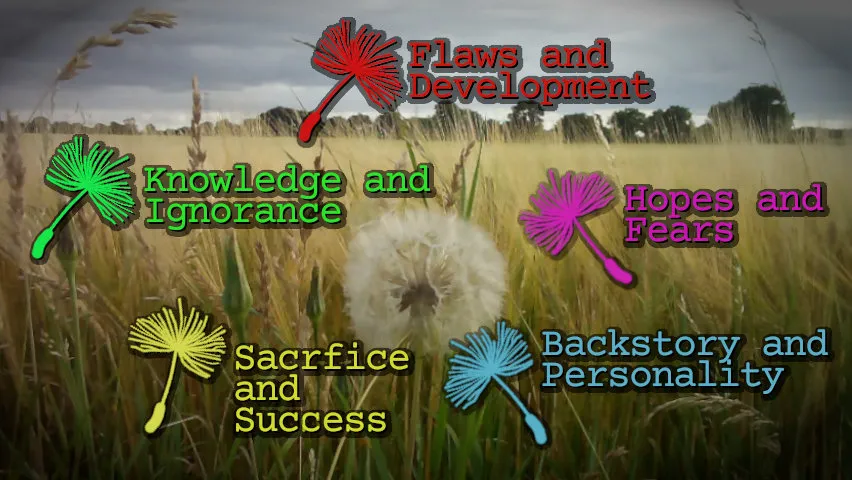As we spoke about last time, the protagonist is the reader’s emotional connection to the world, and often the driving force behind the development of the plot as well. We came to understand that stories are manipulation of human emotion, amplified through one’s attachment to the protagonist, and that a good way to go about creating this is to:
- Take a character and create an emotional investment in them
- Put them in a situation of danger or frustration of their goals
- Take us with them on their journey of personal development
In the process, an attachment to the character should form. We’ll succeed when they succeed; we’ll hurt when they hurt. But why should it form?
Luckily for us, it’s already human nature to connect with people. It came about, evolutionarily, from the need to project ourselves into other people so we could learn from their mistakes.
So… let them make mistakes! Don’t have an infallible character. Give them a flaw: vanity, naivety, selfishness, there’re many. Make their own personality work against them. It can be annoying to read a character who’s too inept and fails constantly because of their own flaws, but if the story is about overcoming those flaws, learning and developing as a person, it will bind the reader to them, as they’d feel the character’s development as if it was their own.
Hero’s Journey
The ‘Hero’s Journey’ may be of use through the Underlying Steps to a Happy Reader:
- Your character starts off being comfortable with what they have. It doesn’t have to be perfect (it can be awful even, stuck living in a slum), but it’s a state of existence which is ‘stable’.
- Next, they want something, which means something comes which changes the state of play. It can be something they personally want, like money or power, but it can also be from misfortune, forcing them into action.
- Next they enter an unfamiliar situation. Without entering somewhere new, or a state of play they don’t know, there’s no story! It needs something unknown the character can experience, something we can experience through the character.
- The character’s development, their adaptation to the new situation is what occurs next. This is where they grow and develop, where we bond strongest to them. If there’s no character development, it’s at least in this stage they get to understand the new environment: find followers who can help, learn martial arts, get the magical cloak, learn the secret code…
- They get what they want. Their desire is fulfilled. That’s next. Usually this comes at the climax of the story or shortly after, but it can also be earlier in the story, with the rising stakes and climax coming as a result of them taking what they’re after. It doesn’t have to bring satisfaction or happiness. Even if they initially did want whatever they wanted for selfish ends, they can find it hollow, or discover it’s worthless. They can still be in a place of danger: getting what they want doesn’t mean they’ve won or that the resolution is over. We all know what happened when Indiana got what he wanted!
- Part six is tricky. It’s the idea that they pay heavily for getting what they want, but rather than happening directly after getting it, it can happen at any point throughout the story. It doesn’t even have to be a specific point. A story about a country man growing into a rich billionaire, he might pay heavily by a gradual loss of all that once connected him to life. But you get the understanding this point is giving. There needs to be an investment on the part of the character. If there’s no threat against them, no loss of some kind, it can lead to a lesser connection with them, as what have they sacrificed to achieve their goal?
- The last two parts happen together, in a sense. They return to their familiar zone of comfort, having changed. I don’t entirely agree with this. For one thing, some protagonists don’t have a development arc, they’re just the same at the end of the story as they are at the start (though it’s usually best they do develop personally).
- Also, on part eight, I don’t agree they have to return to their ‘familiar zone of comfort’. Not all stories have happy endings, as we said before. They can be stranded, lost. They can return home and find it empty of satisfaction, now they’ve seen the true scale of this world and their own ability. It can even be they’ve changed so much, they now relate to what was initially an ‘unfamiliar situation’ more than their own ‘familiar situation’.
- Like in any advice you get in writing, it’s just a suggestion of what you might find useful.
Relatable Characters
Alongside giving the protagonist a journey which fulfills the desires and engagement of the audience, it is also very useful to create a protagonist to whom the reader can relate to.
If they can’t relate to your protagonist, how are they supposed to feel the emotional entanglement which drives their passion and energy towards reading the story?
The fundamentals of a main character are:
- Something we can relate to, be it a lifestyle, objectives in life or a personality trait we can connect to. We can relate to Doctor Watson for his modesty and patience, Bertie Wooster for his care-free, selfish engagement in life. Even that little bear from Peru, we attach to him because of his innocence, viewing the world with the freshness of a child…
Doctor Watson, Bertie Wooster and Paddington Bear
- A few flaws to their character usually makes them more compelling and interesting. Humans aren’t perfect creatures, and someone portrayed as genuinely ‘perfect’ isn’t only difficult to associate with, but… wouldn’t it be boring too?
- Gandalf’s flaw is both his temper and his compassion. He can be stern and self-righteous when he’s frustrated, moves people around the map of Middle Earth like chessmen, and tries to see good in all of his companions to the point he doesn’t suspect the One Ring for many years.
- They also need something about their personality which makes them memorable: a way of thinking, a way of talking, acting, a belief which makes them distinctive. Look at what they do now and work backwards. Find their past, their friends, their knowledge and upbringing. Try to get at least an idea of why they used to be, what made them as they are now.
- They also need to have something which drives them, something they want… but this is covered already within the framework of the Hero’s Journey.
Conclusion
A well-made character the audience can connect to will carry the story through to the end. This, genuinely, is what the protagonist is for, the very core of their purpose. Give them challenges, temptations, grind away at their strengths and make them face up to their flaws and weaknesses, be it in themselves, or outside in the dangers of the world.
Keep them consistent with themselves. Or inconsistent, if the situation they’re put into is one which affects them emotionally. Get them to question what’s around them, think for themselves; make a backstory. Even if it’s not in the story itself (it’s not good to include too much backstory, unless it’s directly useful to the plot) it’ll help you understand them.
Give them something to fight which is stronger than they are, let them make sacrifices, or at least take risks. Make them experience life with full vividness, let it change them, let them react to the world around them. They can even be completely cray-cray by the time the story’s up!
You admire a character for the effort and the sacrifice, more than for ‘winning’.
We tend to think of heroes as being flawless. And actually, most of time it’s the opposite. It’s again part of human nature, to idolize those we see as successful, to the point of only seeing in them what we want to see – perfection.
Let us know if any of this was useful. If there’s details we’ve missed out, anything you don’t agree with or any questions you have, send us an e-mail.
Also, we can help you with your characters. Inlet provides a ‘Character Analytics’ service, where we break down and build up your characters from the heart of what makes them tick, no matter how much or how little you’ve written about them. We can service as many or as few of your characters as you want, and give you whatever advice you’re looking for to make them stand out.



